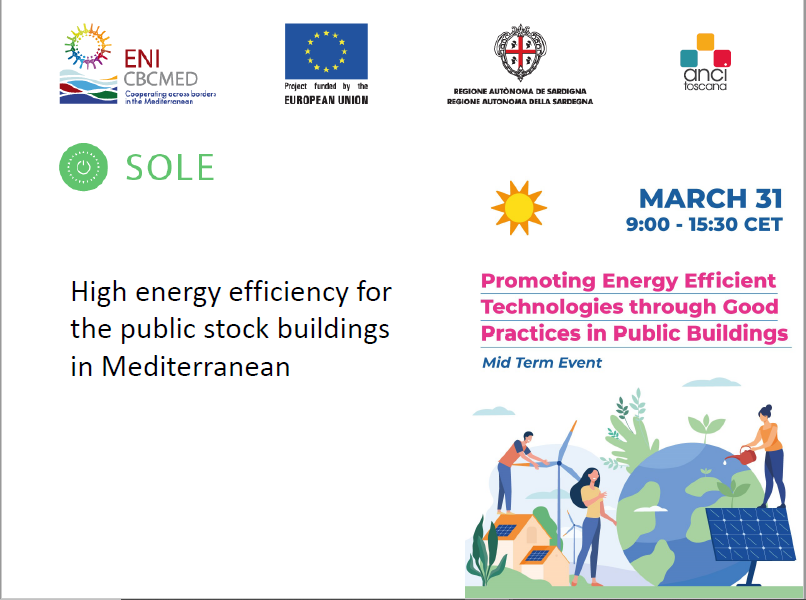SOLE´s partners discussed different approaches towards the energy efficiency in public buildings

On Thursday 31st March 2022 from 09:00 to 15:30 the event entitled "Promoting energy efficiency technologies through good practices in public buildings" took place in online mode within the framework of the SOLE project. The meeting was organised by the Jordan partner, The Royal Scientific Society (RSS), which collaborated with the entire partnership for its preparation. This initiative was an important occasion for the SOLE project, which has now been running for more than 18 months, to report and assess the main results achieved so far.
Each partner presented the progress of its own energy upgrading requalification plans of the selected public buildings, both from a technical and financial point of view, and described their future steps. The Jordan partner showed a short video that explained the stages that the project has gone through as they are in the final phase of energy performance improvement works at the Iskan Faiha School, a public school in Madaba, located 33 km south-west of the capital Amman.
The Andalusian Energy Agency presented the results of the seminars held from December 2020 to May 2021 about the technologies solutions and financial opportunities for the improvement of the energy use in public buildings.
The Italian Partner Agenzia Regionale Recupero Risorse (ARRR) officially launched the Act Green campaign and invited all the partners and anyone who might be interested to adopt the low or zero-cost measures suggested that can influence energy consumption in public buildings as well as at home. A video summarising the main suggestions of the campaign was shown and it’s useful for its promotion.
Furthermore, in order for the partners from different projects to work together, special guest Richard Hurst from County Durham (UK) gave a presentation on how the authority has dealt with the transition to hybrid working after the lockdown and the implications of this on CO2 emissions. Research was conducted and the energy consumption data of 7 office buildings (from Durham County Council and Durham University) and employees’ homes were collected in order to find the impact of Covid-19 on energy usage and carbon emissions of employers and employees.
The key findings were that on the one hand the office buildings saved a large amount of CO2 emissions in the first lockdown and at the same time less travel reduced a large amount of CO2 emissions from cars (up to 5 times greater than the impacts of energy usage at home); on the other hand the home working produced around 5% more CO2 emissions from gas and electricity. Overall, CO2 reduction in office buildings wasn’t as significant as expected because many of them have heating systems that can’t be zoned, so they are switched on for 20 staff or for 1300 staff; in addition home-working reduced a large amount of CO2 emissions (20% on average for car commuters, while it increased in general for those walking, cycling or using public transport).
These important findings should be considered by the SOLE partner in order to assess and take measures to account for actual presence in offices and empty rooms in order to regulate the need for heating and lighting.
For more information on the event, the speakers’ presentation can be found here:
- PRESENTATION_ANCITOSCANA
- PRESENTATION_Andalusia
- PRESENTATION_ARRR
- PRESENTATION_DurhamREBUSHome
- PRESENTATION_Egypt
- PRESENTATION_Italy
- PRESENTATION_Lebanon
- PRESENTATION_Tunisia







